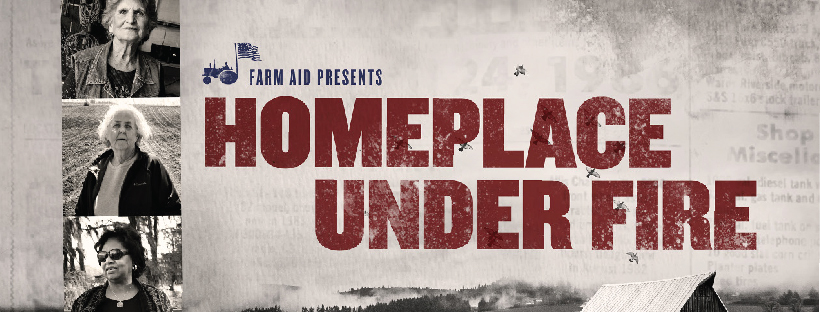Homeplace Under Fire, the new documentary produced by Farm Aid, celebrates the unsung heroes of the 1980s farm crisis.

A number of factors, including a series of droughts, low crop prices and high production costs, plummeting land values, and bad lending practices, precipitated what would become known as the 1980s farm crisis, which forced hundreds of thousands of farmers into foreclosure and many off of the land their families had owned for generations.
The 30-minute film tells the stories of eight regular folks who stepped up and taught themselves the ins and outs of federal regulations in order to fight against a bureaucratic system – one that had once helped farmers but by the early 80s was pretty much doing the exact opposite – to keep themselves, neighbors, and oftentimes strangers on their farms. Some of the advocates featured started and manned hotlines that not only connected desperate farmers with organizations that could help them, but even went as far as to play double-duty as a suicide hotlines, preventing some callers from ending their own lives. In the film, Nelson calls these unsung heroes “the best of America.”
“Homeplace” also focuses on the especially difficult problems faced by African American farmers in the South who had the added burden of racism. Two of the film’s subjects, Shirley Sherrod, a Civil Rights activist and farmer in Georgia, and Ralph Paige, who helmed the Federation of Southern Cooperatives, helped organize African American farmers. When Farm Aid came into the picture in the 1980s, they helped connect Sherrod and Paige with other farm organizations across the country.
“Suddenly they weren’t isolated anymore. Black farmers and white farmers were able to come together for the first time because the Farm Aid had the funding to do it,” the films director, Charles D. “Charlie” Thompson, tells Modern Farmer in a phone interview. “Once they started sharing their stories, they discovered there was a lot of common ground.”
In 1999, a class action lawsuit known as Pigford vs Glickman, concerning the USDAs discrimination against African American farmers, resulted in nearly a billion dollars being paid out to more than 13,000 farmers. In 2010, Congress appropriated another $1.2 billion for some 70,000 more farmers of color.
Thompson, a cultural anthropology professor at Duke University and a documentarian, was himself involved in farm advocacy back in the 80s before going into organic farming and, eventually, academia. In the summer of 2014, when Farm Aid’s annual concert was taking place in Raleigh, North Carolina, where Duke is located, Farm Aid staff met with Thompson and they eventually joined forces to tell the stories of these advocates, many of whom were getting on in years. One of the subjects, Lou Anne Kling, passed away not long after “Homeplace” was completed (the film was dedicated to her).
“We weren’t 100 percent sure how this would shape up, we just knew we needed to capture their spirit, commitment and uniqueness,” says Carolyn Mugar, Farm Aid’s executive director. “We wanted to share their stories with people.”
Mugar has worked with all the film’s subjects “since day one of Farm Aid” and has a deep respect and admiration for them. She says after seeing the finished film she was “grateful and relieved” by how well it captured their “spunk and take-no-prisoners and never-give-up attitude. I can’t watch the film without crying because I think these people are so amazing.”
Thompson and a small crew traveled across the country, often to very rural areas, in order to interview the advocates and capture their reunions with some of the farmers they helped and in many cases hadn’t seen for 30 years or more. The film packs a huge emotional punch. Thompson credits the advocates and farmers themselves for this; he had the advocates take the lead in setting up meetings with the farmers who had the courage to speak about their heart-rending experiences on camera. “When you see them hugging each other with tears in their eyes, this was the first time they’d talked about a lot of this,” he says. “The farmers wouldn’t have told me anything if I’d just called them up, especially about their finances, especially while starting to cry, but they said it to the advocates who had been there for them. We were just the fly on the wall.”
The immediate plans for the film include a tour of the towns the advocates call home, says Mugar. The film will also be entered in film festivals with rural themes, according to Thompson. We’ll update this story when the film goes into general release.
For Mugar, “Homeplace” isn’t just meant to highlight the important role of these eight farm advocates, but to inspire the next generation as well. Thompson agrees. “It needs to be about going forward because the crisis hasn’t ended, it’s just changed. There are fewer farmers then there were in the 80s and we’re entering another period of crisis. Who’s going to be there to answer the phones? Who’s going to be there to sit before the legislators and try to tell the story from the perspective of people who are living it? It’s not nostalgia, it’s about passing the torch, appreciating where the advocates have come from, what they’ve done, and how much they’ve contributed to this country and to say OK, who’s going to step up now.”